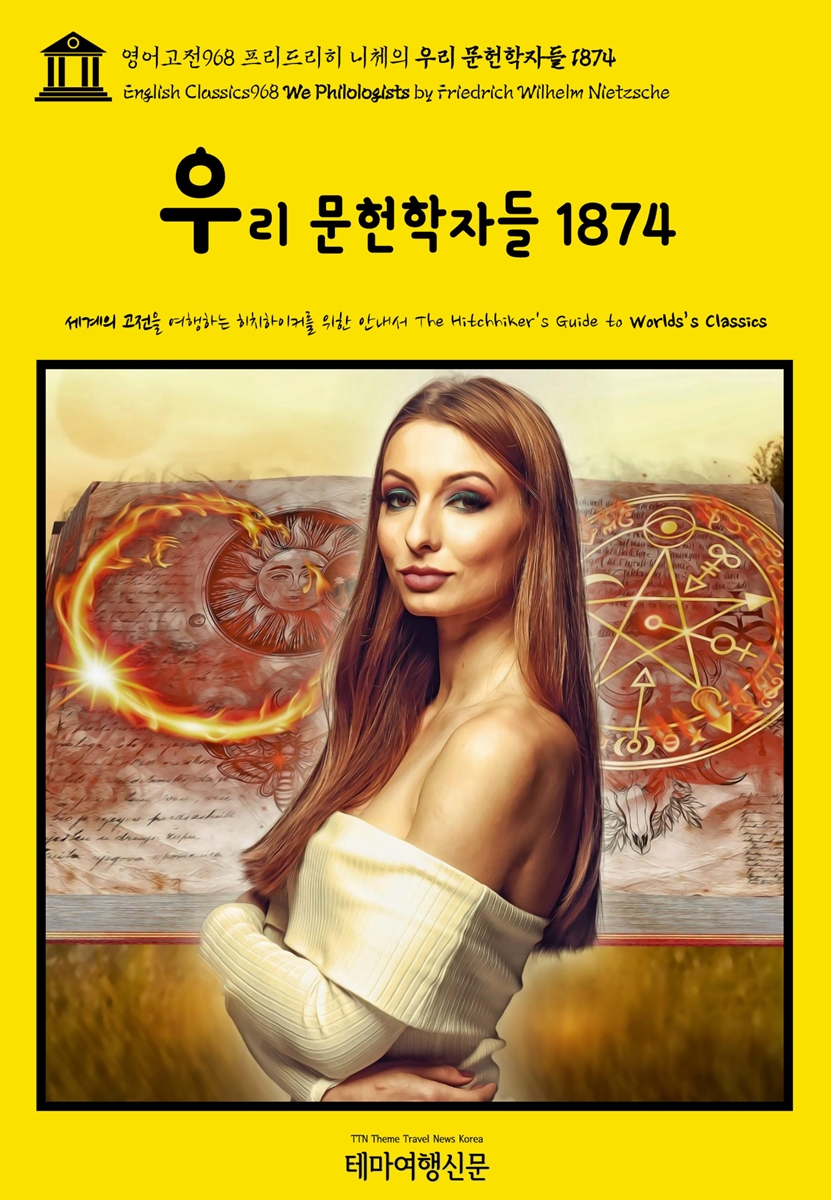▶ 우리 문헌학자들 1874(We Philologists by Friedrich Wilhelm Nietzsche)는 프리드리히 니체(Friedrich Wilhelm Nietzsche, 1844~1900)가 총 13개의 주제(The Cultural Philistine, History, The Philosopher, The Scholar, Art, The Teacher, Religion, State War Nation, The Press, Natural Science, Folk Society, Commerce, Language)로 집필한 다섯 번째 원고입니다. 니체는 교수로 재직한 이후 교육에 대해 깊은 관심을 보였고, 기존의 독일 교육 시스템과 교육자에 대한 비판과 고전 문화에 대한 교육법에 대해 다양한 의견을 개진하였습니다. 특히 현재의 세대에게 미치는 현대 기독교(modern Christianity)의 해악을 강도 높게 비판하였으며, 같은 맥락에서 고대 그리스 문화(Greek antiquity)와 알렉산드리아 문화(the Alexandrian culture)에 대해서도 냉소적인 시선을 보냈습니다. 구체적으로 후대 그리스 사상(later Greek thought)이 지나치게 과장된 반편 초기 그리스 사상(early Greek thought)이 과도하게 과소평가되었다고 주장하는 등 고전적 고대(Classical antiquity)의 종교적이고 자유주의적인 원칙(religious and "liberal" principles)이 무비판적으로 전래되고 있다고 지적하였습니다. 테마여행신문 TTN Korea 영어고전(English Classics)과 함께 어제도, 오늘도, 내일도 멋진 문학여행을! B
▶ 프리드리히 니체의 계절에 맞지 않는 생각 1873(Thoughts out of Season by Friedrich Wilhelm Nietzsche) 혹은 유행에 뒤떨어진 관찰과 계절에 맞지 않은 생각(Unfashionable Observations and Thoughts Out of Season)은 프리드리히 니체(Friedrich Wilhelm Nietzsche, 1844~1900)가 1873년부터 1876년 사이에 집필한 네 편의 작품을 묶은 편집본으로 각각의 에세이는 10여 편으로 분절되어 있습니다. 니체의 유고 노트에 따르면, 그는 총 13개의 주제(The Cultural Philistine, History, The Philosopher, The Scholar, Art, The Teacher, Religion, State War Nation, The Press, Natural Science, Folk Society, Commerce, Language)로 에세이를 기획하였으나, 생전에 완성한 것이 바로 본서에 실린 네 작품입니다.
▶ TRANSLATOR'S INTRODUCTION. The subject of education was one to which Nietzsche, especially during his residence in Basel, paid considerable attention, and his insight into it was very much deeper than that of, say, Herbert Spencer or even Johann Friedrich Herbart, the latter of whom has in late years exercised considerable influence in scholastic circles. ▷ 번역가의 서문. 교육의 주제는 니체가 특히 바젤에 거주하는 동안 상당한 관심을 기울인 주제였으며 교육에 대한 그의 통찰력은 허버트 스펜서 또는 요한 프리드리히 허버트보다 훨씬 더 깊었습니다. 말년은 학계에서 상당한 영향력을 행사했습니다.
▶ These scattered aphorisms, indeed, are significant as showing how far Nietzsche had travelled along the road over which humanity had been travelling from remote ages, and how greatly he was imbued with the pagan spirit which he recognised in Goethe and valued in Burckhardt. Even at this early period of his life Nietzsche was convinced that Christianity was the real danger to culture; and not merely modern Christianity, but also the Alexandrian culture, the last gasp of Greek antiquity, which had helped to bring Christianity about. ▷ 이러한 흩어진 격언들은 참으로 인류가 먼 옛날부터 걸어온 길을 따라 니체가 얼마나 멀리까지 왔는지, 괴테에서 인정하고 부르크하르트에서 높이 평가했던 이교적 정신에 얼마나 깊이 젖어 있었는지를 보여준다는 점에서 의의가 있습니다. 니체는 생애 초기에도 기독교가 문화에 대한 진정한 위험이라고 확신했습니다. 현대 기독교뿐만 아니라 기독교를 낳는 데 도움이 된 그리스 고대의 마지막 헐떡임인 알렉산드리아 문화도 마찬가지였습니다.
▶ Classical antiquity, however, was conveyed to the public through university professors and their intellectual offspring, and these professors, influenced (quite unconsciously, of course) by religious and "liberal" principles, presented to their scholars a kind of emasculated antiquity. ▷ 그러나 고전적 고대는 대학 교수들과 그들의 지적 후손들을 통해 대중에게 전달되었고, 이 교수들은 (물론 상당히 무의식적으로) 종교적이고 "자유주의적인" 원칙에 의해 영향을 받아 학자들에게 일종의 무력화된 고대를 제시했습니다.
▶ WE PHILOLOGISTS. I. To what a great extent men are ruled by pure hazard, and how little reason itself enters into the question, is sufficiently shown by observing how few people have any real capacity for their professions and callings, and how many square pegs there are in round holes: happy and well chosen instances are quite exceptional, like happy marriages, and even these latter are not brought about by reason. ▷ 우리 문헌학자들. 제1장. 인간이 순전히 위험에 의해 얼마나 많이 지배되고 있는지, 이성 자체가 문제에 얼마나 적게 들어가는지는 그들의 직업과 소명에 대한 실제 능력을 가진 사람이 얼마나 적은지, 그리고 얼마나 많은 네모난 말뚝이 있는지를 관찰함으로써 충분히 알 수 있습니다. 둥근 구멍: 행복하고 잘 선택된 경우는 행복한 결혼과 같이 매우 예외적이며 후자조차도 이성으로 인해 발생하지 않습니다.
▶ A man chooses his calling before he is fitted to exercise his faculty of choice. He does not know the number of different callings and professions that exist; he does not know himself; and then he wastes his years of activity in this calling, applies all his mind to it, and becomes experienced and practical. When, afterwards, his understanding has become fully developed, it is generally too late to start something new; for wisdom on earth has almost always had something of the weakness of old age and lack of vigour about it. ▷ 사람은 자신이 선택한 능력을 행사하기에 적합해지기 전에 자신의 부름을 선택합니다. 그는 존재하는 다양한 부름과 직업의 수를 알지 못합니다. 그는 자신을 모릅니다. 그런 다음 그는 이 부름에 자신의 활동을 낭비하고 온 마음을 다해 경험이 풍부하고 실용적이 됩니다. 그 후 그의 이해력이 완전히 발달했을 때 일반적으로 새로운 것을 시작하기에는 너무 늦었습니다. 지상의 지혜는 거의 항상 노년의 약점과 활력 부족을 가지고 있기 때문입니다.






